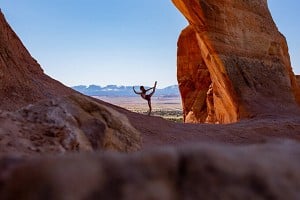
For years I have often wondered: "What is the best food to eat whilst at the crag?" My friends were eating flapjacks and I was stodging my way through three packs of sandwiches. Were they climbing better than me that day? If so, was the food blame for my fatigue?
On top of this, I obviously coach a lot of competition climbers. They have strict training regimes and then long stressful days in walls competing for 8 hours! What should they be eating before, during and after training and what are the best foods to eat whilst in competition mode – what can fuel you for that long?
I am sure many of you will work long hours. You then head to the wall and eat late before jumping into bed and then repeating the process. Are you eating at the right times? Are you eating the right foods? Are you taking the right supplements? Should you be taking supplements?
These questions are running through all of our thoughts. And being a coach, I would like to be able to answer some of the questions myself, but also help others too.
It is always best to consult a professional, and no-one knows more about nutrition than Rebecca Dent: "Rebecca is a High Performance Dietitian leading the way in providing world class sports nutrition advice to the adventure industry." Rebecca is the High Performance Dietitian for the GB climbing team and is probably helping all the people at the wall you look at in awe!
Hi Rebecca, how important is our diet in relation to climbing?
Very, our body is made up of the nutrients we eat and it is food that provides the energy to be able to climb. When climbing, you want to be able to put maximum effort in to get the most out of that session and you need to eat to help the body repair itself after climbing. Whilst climbing you are causing your body stress and it is in the rest period that you get fitter / stronger and adapt to that session resulting in better climbing (hopefully). If you fail to eat the right foods at the right times in the right quantities you will hamper your ability to climb and the recovery process, which will prevent you from reaching your full climbing potential.
I guess the best place to start is at the wall. Before training, is it a good idea to get some food in me?
Yes if you haven't eaten for about 3hrs it's best to get some food in, but saying that if you have been sat at a desk all day during work then you are not going to need much (you've not been working your muscles to use the fuel in them so they are still going to be pretty stocked).
So what is the best thing to be eating before a training session and how long in advance should I eat?
You do need to eat some carbohydrate before climbing. Climbing is a high intensity sport and you simply can't access fat quick enough from your body to use as a fuel source during climbing. So carbohydrates are important to eat before climbing. That does not mean they have to be sugar loaded. Time your snack right and you can choose better quality carbohydrate to eat. A source of protein can be added to your snack but it is not essential to climbing performance at this point.
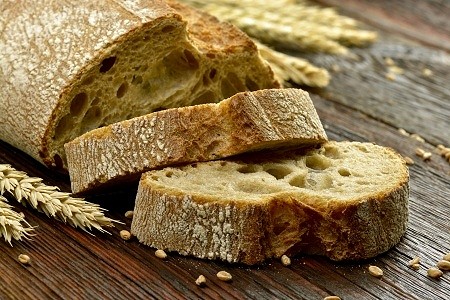
Suitable snacks before climbing include banana, oat cakes + peanut butter/cottage cheese, protein bar, oat/seed based cereal bar, banana and glass of milk, protein shake (made with milk), banana pancake, yoghurt + muesli, a nutritious meal with brown rice, sweet potato, porridge if timed right.
Does the best food vary for what type of session I am doing?
Generally you need to make sure you are fuelled to put in your maximum effort. The quantity of food will vary for the type of session, depending on duration/how long you are climbing for. If it is a short 1hour session then it is unlikely you will need to eat anything during. It if is a long day out on the crag then a regular fuel supply will be needed with intakes of protein also throughout the day. The type of carbohydrate required may change depending also on the session e.g. if it's a final hit of energy you need to make a hard last effort then a quick acting carbohydrate is required (gels, jelly sweets), slower burning carbs can be eaten for longer sessions (banana, seed/oat bars).
The total amount of nutrients day to day such as carbohydrate and protein will change depending on the training phase you are in endurance/power or strength and the duration of climbing/activity that day. The type of food will also change depending on your current performance/body composition goals, it's all very individual. But as always it's choosing natural real good quality nutritious foods to eat at any time. Each time you eat something, simply think is this having any benefit? Doing any good? Serving me a purpose towards my climbing goals? Don't waste those calories you are earning!
Should I eat differently if I am doing endurance training to if I am campus board training?
Yes, I educate all the climbers I work with on periodisation of eating; Climbers need to adjust their eating during each training phase, for each climbing and body composition goal, day to day and session to session. This is achieved by adjusting energy, carbohydrate and protein intake primarily based on volume, duration and intensity of training. A campus board session will be a short duration session but requires a lot of all-out strength and power, you are unlikely to need to eat during campus board training but being fuelled for that session will be imperative so you can give it your max. For endurance training you will need to think about both what you eat before and eat regularly during (approx. every 30minutes) in order to help sustain the session and delay tiring too early.
Ok, so that's my pre-session food sorted, now let's look at during climbing. I see many people who spend 4-6 hours at a wall. I also see people who come in, do their 1-2 hours training and then head home. What should these two types of climbers be eating whilst at the wall if anything at all?
For those that spend 1-2 hours at the wall, fuelling before will be the most important. A lot depends on the intensity, how much effort you are putting in and type of session i.e. finger board, circuits, bouldering vs sport and the individual, male/female, age level of training, nutrition and fitness goals. In general terms if doing a shorter session it is unlikely any food is required. If doing a 2hr session a smaller fast acting energy snack may be beneficial towards the end in order to climb to your best in the full 2hrs e.g. banana, sports drink, a gel for a fast hit of energy to have a final go at a move, route, circuit, lap but this may not be essential/ required.
It's a good idea to monitor your own performance during a 2hr session, to determine if you need to fuel. Try a session as your usual routine, then on the next session add in a snack. Compare the two sessions and monitor if eating anything helped you climb better. This is quite crude and not very scientific but self-awareness is key when it comes to your nutrition and its impact on your climbing.
For climbers who spend 4-6 hours in the wall preparation will be the key to getting the most from this session. Making sure enough food and fluid is taken to the wall to sustain you. I would advise around 60-90minutes start to drip feed fuel and fluids e.g. taking a couple of generous mouthfuls at a time of food and sipping from your water bottle. This will also have the benefit of keeping your stomach lighter on food, rather than eating bigger amounts at any one time. If it is a 6hr session and breaking for lunch then a quinoa or rice salad with a source of protein (e.g. chicken, tuna, egg) would be fine or wholemeal pita bread or whole grain wraps filled with protein as opposed to heavy sandwiches.
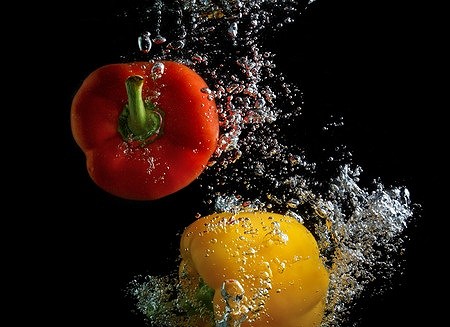
Now, it's home time. I'm feeling knackered and I've got a good 30minute drive before I get home. Should I eat something as soon as I finish?
Again it depends on the length of your session and if you consumed any protein during. The 2hr window of opportunity to refuel is really only essential if you have twice day training / climbing sessions and the time between these two session is limited. Then you use this window to maximise refuelling and recovery so you are ready for session two of the day. Also this 2hr window is useful if you are climbing day after day for long periods (i.e. trip, elite climber, climbing holiday).
If you only have a 30minute drive home and then you will be eating your next meal within 30-60mins once home then eating something immediately after climbing is not essential. If you know it's going to be longer than 1-2hrs before you next meal then yes, eat something as soon as you finish. However in general a small protein containing snack after climbing for anyone could benefit to kick start the recovery process e.g. protein shake/milk/milkshake.
And once I get home?
Your meal should include around 20-25g of good quality protein e.g. fish fillet, chicken breast, tofu, salmon steak, 125g beef mince, 400ml milk, 3 eggs PLUS some good quality carbohydrate e.g. brown rice, oats, quinoa, sweet potato, starchy vegetables (carrots/ parsnip/pumpkin/butter nut squash) and plentiful vegetables ideally green leafy/cruciferous veg. Not forgetting some healthy fats (olive oil, olives, avocado, oily fish, nuts & seeds). Protein will help repair and rebuilding of muscles, carbohydrate will help refuelling and green leafy vegetables again help muscle repair, recovery and health. If you do not consume sufficient energy day to day then the protein will merely be used as an energy source and leave very little to promote muscle recovery and adaptations to your climbing training. The recovery meal after climbing is one of the most important to get right!
Brilliant, so that's indoors considered, now let's look at a day at the crag. So what would be the best breakfast to fuel a solid day on the rock?
Oat and quinoa porridge with ground seeds, desiccated coconut, made with milk (add scoop of whey or skimmed milk powder to get the 20g protein hit) and drizzle with honey or maple syrup is my favourite (basically a breakfast containing good quality carbohydrate and around 20g protein).
And whilst I am climbing? Should I have my supermarket meal deal? Should I just be eating flapjacks? Is it a good idea to have the classic chocolate bar at the crag and should lunch be ate in one sitting, or little nibbles throughout the day?
Climbing at the crag usually means time for rest or at least breaks in between climbing. It's about being prepared, a wholegrain sandwich would be ok, along with rice/pasta/quinoa salads (not the ones filled with mayonnaise however, I'm talking homemade) for lunch, but I would advise to break it up into two sittings. It's about drip feeding the muscles throughout the day to provide the climber with a continuous supply of energy, prevent over eating and help keep a feeling of a lighter stomach. Other suitable snacks could include a seed/oat/nut based bar, banana, protein shake, oat cakes + nut butter, homemade banana loaf/ energy balls. Eating little and often throughout the day would be better.
One question that I have been asked recently regarding trips is: When redpointing and feeling pretty run down towards the end of the day, what should I eat to make the most of those last few attempts? Is loads of sugar a good idea?
A gel/sugar hit will certainly help give you that final boost to push to make an all-out last ditched effort. An addition of caffeine can give you a performance benefit at this point. Even if it creates a placebo effect you are on to a winner.
Brilliant, that's great!
Right, let's look at the youth climbers who have the up and coming Youth Climbing Series finals approaching, or the GB teams about to start their competition season.
What is the best food to eat during a whole day at the wall competing?
A mix of carbohydrates and protein from foods and liquids throughout the day. Depends on the amount of climbing taking place that day, if you only have up to 3-4 climbs, energy requirements are not going to be vast so it is eating regularly to sustain energy. A good breakfast containing carbohydrate would be ideal (porridge, banana pancakes, muesli + yoghurt, scrambled egg on granary toast or a smoothie, glass of milk + banana if not feeling hungry from nerves). Then a small snack every 2hrs or 1hr to 30minutes before an attempt on a route (oat cakes/rice cakes + peanut butter, sports bar, nuts, seeds and oats based bar, banana) again this can be in liquid form if nerves have come into play to effect appetite e.g. protein shakes, milk, milkshakes, smoothie. Keep foods light at lunch e.g. wraps / pitta breads filled with protein to help stop the climber from feeling full which could impact climbing performance.
Well, there you have it.
Ok, now let's talk about specifics. The most common thing to hear about in climbers is getting in your protein. We've seen it in the gym for years, but protein drinks/shakes are creeping into the climbing scene. Is this a good idea?
Yes they are great and can be a convenient, inexpensive way of ensuring you are getting enough protein daily.
What type of protein (shake) is best?
Whey protein is the best as it is more readily absorbed than any other protein and whey protein has been shown to stimulate muscle protein synthesis the most over other powdered proteins. I always recommend unflavoured whey protein as it does not come with any other hidden nasties in terms of colourings and preservatives or sugar. Then add to this (milk, water, and fruit) to suit your own climbing goals for during and recovery. If you want to purchase a flavoured protein that's ok, if it encourages the climber to drink a recovery shake or take on board protein during climbing. The sugars from the shake at this time will aid the refuelling process. Ultimately you can save yourself even more money and just drink full fat milk during or after a climb, which is superior to recovery than any shake you can buy. If you are vegetarian or vegan I would advise pea protein as the next best thing to use and perhaps add some leucine to this.
What about Creatine. I've heard of more climbers using this recently. Obviously a lot of gym goers use it, but climbers have been scared of the repercussions of gaining mass. Is this true? Does it affect your climbing at all?
Creatine is a supplement *most* adult climbers should try [NB. if you are thinking of taking Creatine and have health issues, please consult your GP]. Creatine is found naturally in red meat, so really it's just a food derivative. Creatine provides an additional energy source during climbing. Those that respond to creatine can be expected to gain around 1-2kg. But creatine can be cycled meaning you can take it during a period of strength/power training (simply the added weight becomes an additional 'weight vest' for training). Then stop taking the creatine and all you lose is the energy supply and not the potential additional strength gains made during that training phase in which it was taken.
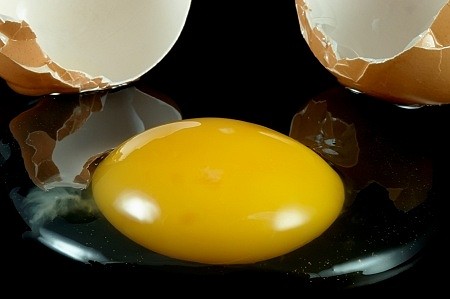
The next fad that seems fairly common is regarding low carb diets? Is this a good idea or will I just fizzle out with no energy?
Depends on peoples' definition of 'low carb'. Low carbs is not no carbs. Again it goes back to periodisation of nutrition (intake to match training / climbing sessions, rest days, off season / injury) and what suits the individual and climbing goals. When people refer to low carb it tends to infer they have cut out bread/pasta and rice, perhaps potatoes and oats too. However carbohydrate is also found in starchy vegetables, fruit and dairy products (milk and yoghurt). As long as then the carbohydrate that is eaten is timed around climbing then it should not have a huge detrimental impact on performance. A low carb diet should include additional fats/proteins in the nutrition plan so weight loss does not occur if weight loss is not required. But what should be advised is carbs are not as bad as some will make out as long as you are choosing the right type of carbohydrate. Plus carbohydrate is still an essential fuel source for climbing. If you looked closely at someone's food diary who describes there diet as low carb, you will be surprised at the amount of carbohydrate that is still present. If a climber over restricts carbohydrate and goes too far, yes they will just fizzle out with no energy.
The same question has to be said about low calorie diets. I have a friend who cut his calorie intake to his resting requirement and trained like a beast, obviously shedding weight and had the trip of a lifetime. Was this wise or a quick fire way to getting injured?
Depends on how long he had to cut and his starting weight. Cutting too quickly to lose weight can result in muscle mass loss aka strength. He may have had weight to lose, then weight he lost would have led to less body weight to pull against gravity, along with feeling light and therefore psyched. For a shorter period with a sensible weight loss this is actually ok. The deal is to never cut calories to below your BMR or you'll end up in trouble and find it difficult to lose, can effect long term metabolism and plus it's not a happy place as you will be only able to eat a very small amount of food and this is not sustainable. The ideal is to lose only 1-2kgs to cut to get to your 'fighting weight'. He may have had this to lose.
On this basis, can we talk about Alex Puccio? One of THE most recognised female climbers and training incredibly hard at the moment. She seems to be uber ripped. Is this recommended? Alex is certainly seeing great gains from it.
She looks in great shape. There is a fine line, a tipping point between peak performance and compromise to health. Granted for women's physiology females' health require more body fat for hormone production and bone health, but I cannot pass any judgement on Alex until I knew her body composition measurements. She may be leaner / built muscle mass and still have a adequate amount of body fat to maintain health and performance.
However as an example, I have worked with some female athletes that have gone beyond that tipping point, who over trained and under ate. Initially you do see an increase in performance but this will peak, then a detriment in both climbing and health starts to manifest. As an example I worked with a national team netball player who went beyond her tipping point, her performance did improve, she liked feeling lean and light and liked the attention it brought her, but eventually it manifested in her game and health, she played centre and whenever she was challenged and knocked by another player she would tumble to the floor and had no strength to defend, along with always feeling tired and slow to recover and became sick. She was captain and eventually demoted from this position because it was a poor reflection on women in netball, having someone in position with an unhealthy body composition but rewarded and made team captain for it is not what a team wishes to represent. Of course all these decisions were made as part of an MDT and this athlete was given a lot of support from myself, coach, sport doctor, sports science team and psychology to help bring her back to health.
With Alex, time will tell I am hoping she has great support around her from her coaches etc and stays fit, well and keeps achieving great performance. There is certainly nothing wrong with this along if she is eating well, not restricting her eating and her body fat levels are desirable. If not it will lead to a dramatic drop in performance, potential injury, ill health and possible over training symptoms.
Ok, for those actually looking to lose weight, are diets as worthwhile as exercise?
A combination of both diet and exercise is the most effective. If someone with weight to lose I would advise simply cutting out all the junk/processed food first. When following a 'diet' people often over restrict or cut out large amounts of certain foods/food groups and find it difficult to follow. A nutrition plan to lose weight should allow for an energy restriction but not be difficult or arduous to follow. The climber needs to be able to adhere to this plan and weight not yoyo or pile it back on and then some as soon as the diet has stopped. The weight loss method again depends on the climber's goals/level of performance/how much the climber has to lose/if losing weight for health or climbing performance.
Which leads us on to the balanced diet. What is the best balanced meal for us climbers?
Nutrient dense foods always! Cut out the junk/processed foods and I can guarantee within 2 weeks you will see an improvement in energy levels, body composition, training/ climbing performance. Good quality proteins, healthy fats and good quality carbs with plenty of green leafy veg, berries, beets, cauliflower etc. Make every mouthful count!
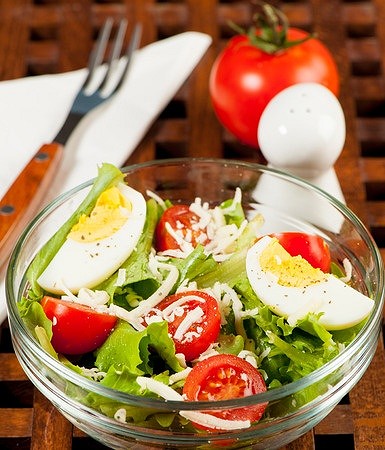
And how often should we eat? I've heard the classic 3 – little and often, 6 meals. What's best?
It doesn't matter, studies have shown benefits to both, depends who you are and what suits you. As long as you are getting the nutrients required to be healthy and train well its ok to eat 3 or 6. Obviously as we have talked about, it's all about timing of intake so get that right, you will do ok
The next thing to consider are the slightly older climbers. Should they be taking supplements to help their joints? Omega 3 seems to be popular, is it any good?
As we age we lose muscle mass, females after the menopause have a greater rate of muscle mass loss and bone loss than males. Older climbers should be focusing on ensuring they get enough protein, females making sure there is enough calcium. Omega 3's are popular and yes I would advise most people to take them but you get better nutrition from eating oily fish the food itself as you get more bang for your buck eating oily fish with all the extra goodness they provide including protein and calcium. Vitamin D is another such supplement that ageing climbers be supplementing especially those climbers that train indoors more than climbing outdoors and during the winter months.
One other serious question is hydration. Do climbers drink enough?
I don't see that many water bottles at the wall, but I hope they do. Drinking on water, sipping regularly throughout the session is an easy way to stay on top of your hydration. Having a drink each time you rest, is a habit everyone can get into.
What are the repercussions of drinking too little?
Poor strength, fatigue early in a session, poor circulation which may impact clearance of hydrogen ions from the 'pump', just generally feeling not on form. Being dehydrated by 3-4% of your body weight can compromise strength performance by 2%. That might not seem a lot but any detriment in strength is going to compromise your climbing and you will feel tired sooner in the session and even feeling thirsty can put you off. Dehydration can increase your perceived rate of exertion, simply just making climbing feel that bit harder. Any bad feelings are going to make you climb under par.
And too much?
Everyone knows too much is not good and in severe cases can lead to kidney problems and in the extreme brain swelling which results in death (you drown yourself basically). If a climber over drinks in a climbing session they will generally feel bloated, headaches and feel uncomfortable - not something I can envisage a climber doing.
Finally, just out of interest, if I am going to go to any country on a climbing trip, which nationality serves the most balanced and nutritious national dish?
If you can hit a good big super market on your trips then you are on to a winner which ever country you are in. France have great supermarkets with lots of choice of fresh ingredients. Do your homework before you go, get there find the nearest supermarket and allow time to walk round to find your staples and healthier options. As with every supermarket the junk food always hits you first with the promotions. Some good items to pack for your trip include whey protein, veg/fruit powders, skimmed milk powder, freeze dried meals (LYO food). Also learn about the cafes/restaurants available before you go and which ones are best, google local food cuisines in the location you are going and see if you need to take additional supplies, speak to fellow climbers who have been to this area. Do your homework.
Thank you so much Rebecca, I know that will help many people in their healthy 2015 approach to climbing.
If you want to improve your health, diet and climbing, please do not hesitate to contact Rebecca by either visiting her website or Facebook page.
Or send her an email on: request@rebeccadent.co.uk
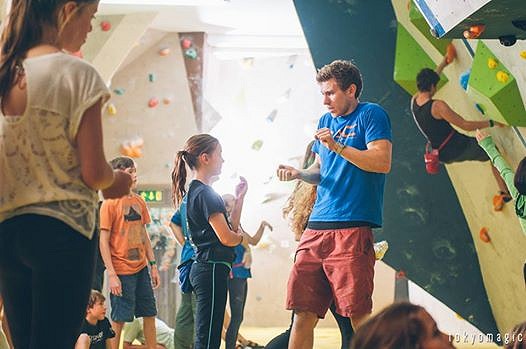
Likewise, if you want help in improving your climbing, technique or need a training programme to make the most of this year, feel free to visit Robin's website or Facebook page.
And email him: coaching@robinolearycoaching.com

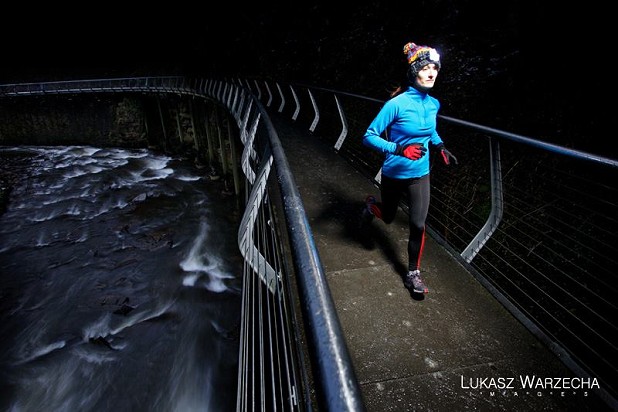
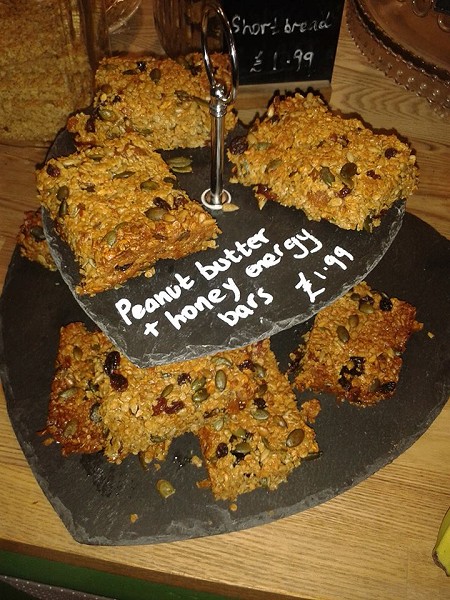
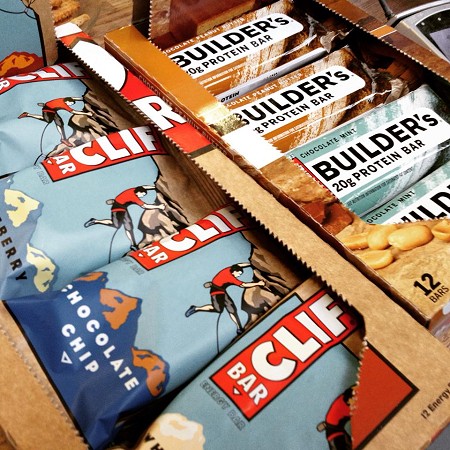
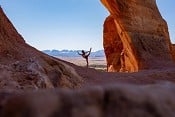
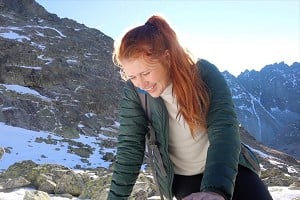

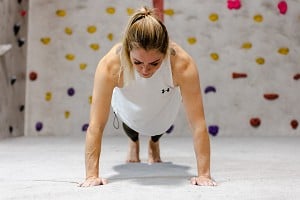
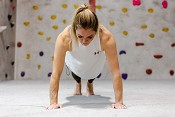








Comments